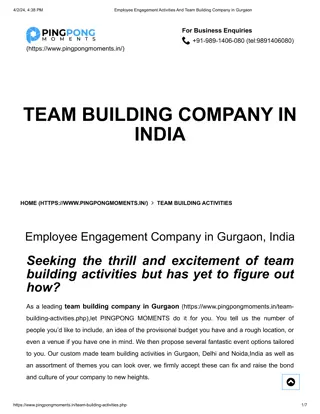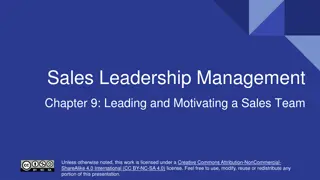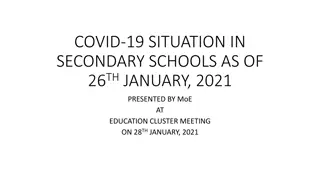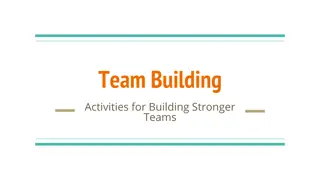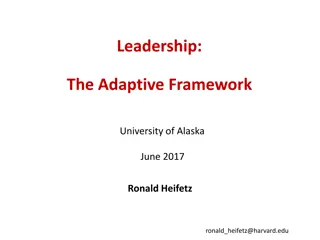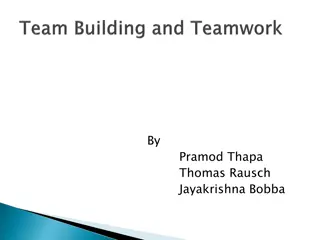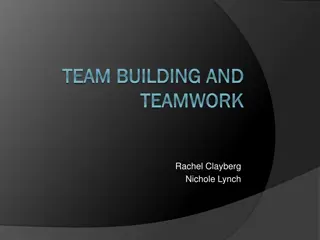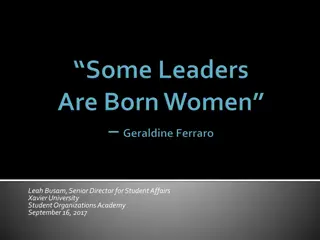Enhancing Team Building and Leadership in Schools
Gain a deeper understanding of team dynamics, leadership roles, and strategies for addressing team issues within your school context. Learn about the importance of effective teams, adult learning principles, benefits of team effectiveness, and the stages of team performance. Enhance your awareness and skills to build and sustain successful teams in an educational setting.
Download Presentation

Please find below an Image/Link to download the presentation.
The content on the website is provided AS IS for your information and personal use only. It may not be sold, licensed, or shared on other websites without obtaining consent from the author.If you encounter any issues during the download, it is possible that the publisher has removed the file from their server.
You are allowed to download the files provided on this website for personal or commercial use, subject to the condition that they are used lawfully. All files are the property of their respective owners.
The content on the website is provided AS IS for your information and personal use only. It may not be sold, licensed, or shared on other websites without obtaining consent from the author.
E N D
Presentation Transcript
MODULE OUTCOMES On completion you will have On completion you will have Greater awareness of issues pertaining to teams ,team building and the leadership Greater awareness of issues pertaining to teams ,team building and the leadership role of the Principal role of the Principal Generated strategies for addressing team issues in the context of your own school Generated strategies for addressing team issues in the context of your own school A model for building and sustaining effective teams in your own school A model for building and sustaining effective teams in your own school
WHAT IS A TEAM? A team is a small number of people with complementary skills who are committed A team is a small number of people with complementary skills who are committed to a common purpose, performance goals and an approach for which they hold to a common purpose, performance goals and an approach for which they hold themselves mutually accountable. themselves mutually accountable. ( (Katzenback Katzenback and Smith) and Smith)
ADULT LEARNING Self Self- -motivation/directed motivation/directed Personal and professional experience Personal and professional experience Outcome oriented Outcome oriented Respect Respect Involvement Involvement Collaboration Collaboration Reflection Reflection
BENEFITS OF AN EFFECTIVE TEAM They are MORE .. They are MORE .. Democratic in decision Democratic in decision making / Share the leadership making / Share the leadership Consultative Consultative Flexible Flexible Synergy Synergy Professional Development Professional Development Empowerment Empowerment Communicative Communicative Thrive v Survive Thrive v Survive Share the load Share the load
STAGES/PERFORMANCE MODEL Orientation Orientation Trusting Building Trusting Building Forming Forming Storming Storming Goal Clarification Goal Clarification Commitment Commitment Implementation Implementation Norming Norming High Performance High Performance Performing Performing Renewal Renewal Adjourning Adjourning ( (Dexler Dexler / / Sibbet Sibbet) ) (Gold & Evans) (Gold & Evans)
LEADERSHIP - BEHAVIOURS Demonstrate integrity/ Model Behaviour Demonstrate integrity/ Model Behaviour Be clear and consistent Be clear and consistent Create positive energy Create positive energy Manage agreement and disagreement Manage agreement and disagreement Encourage, Support and Mentor Encourage, Support and Mentor Provide Resources Provide Resources Share information Share information
LEADERSHIP - ACTIONS Identify team members Identify team members Involve members in objective setting Involve members in objective setting Give time for introductions, expectations and Give time for introductions, expectations and clarifications clarifications Deal with issues when they arise Deal with issues when they arise Communication Communication
Team effectiveness analysis: Are you leading teams or groups? Focus on a team in your school, of which you are a member. Use the rating scales in each section to measure how well or poorly you consider this team to be performing currently. VALUES/PURPOSE ARE NOTWE SHARE AND IMPLEMENT DISCUSSED 1 2 3 4 5 COMMON VALUES LEADERSHIP IS RESTRICTED LEADERSHIP IS SHARED TO 1 OR 2 PEOPLE 1 2 3 4 5 ACCORDINGTO NEED (West-Burnham)
What are the factors influencing effective team leadership? BE ABLE TO PRIORITISE AREAS BE ABLE TO PRIORITISE AREAS VISION VISION COLLECTIVE OWNERSHIP COLLECTIVE OWNERSHIP DELEGATION DELEGATION TIME ALLOCATION AND TIME ALLOCATION AND COMMITMENT COMMITMENT COMMUNICATION COMMUNICATION SHARING SHARING TARGETS CLEARLY SET TARGETS CLEARLY SET TRUST TRUST ABILITY TO LISTEN ABILITY TO LISTEN INTEGRITY INTEGRITY
BELBIN A Team Role is defined as "a tendency to behave, contribute and interrelate with A Team Role is defined as "a tendency to behave, contribute and interrelate with others in a particular way." others in a particular way." For a team to be successful it needs to have access to each of the 9 Belbin Team For a team to be successful it needs to have access to each of the 9 Belbin Team Roles. Roles. Typically, most people have two or three Team Roles that they are most Typically, most people have two or three Team Roles that they are most comfortable with; a few others that they can manage to cover if they need to; and comfortable with; a few others that they can manage to cover if they need to; and finally the rest that they prefer not to adopt at all. finally the rest that they prefer not to adopt at all.
Belbin Team Roles Belbin Team Roles Team roles test - Free psychological tests https://www.123test test.com/team team-roles roles-test test/ 5 minutes
Tortoise Lion Monkey Donkey Frog Giraffe An Effective Team! An Effective Team Which one are you?
Im a Tortoise I m a Tortoise Don t ask me to run! Don t ask me to run!
ROLE ROLE- -PLAY PLAY
Team Process Review! Did some members block/opt out of the process? Did people listen to each other? Did the team start with clear, agreed objectives? Was the use of time properly planned/managed? Did ideas get lost? At what point? Why? Did the team accomplish its objectives within the time-frame allowed?
FINALLY?....... Action Plan Action Plan Does your staff need in-service on teams? What ideas will you bring back to your school? What ideas will you bring back to your school? How will you apply your learning to existing teams or teams you wish to create in your school?


